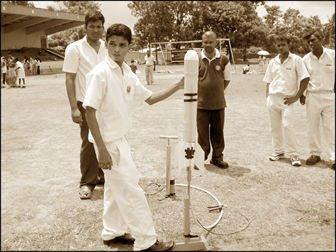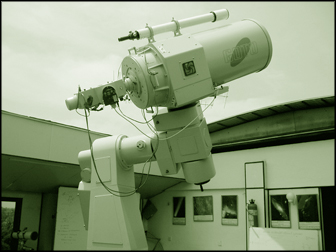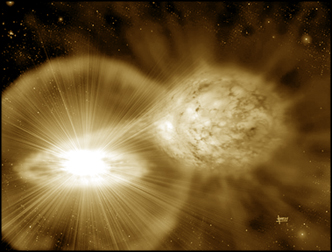|
World Space Week:
Honing on modern technology
by Sajitha PREMATUNGE
The apparent snail’s pace Sri Lankan space exploration is moving
forward may be frustrating for science fiction buffs. But with the World
Space Week beginning today the limelight has yet again fallen on space
science and technology. And what better place to start a discussion on
‘Space’ than the Arthur C. Clarke (ACC) Institute, dedicated to space
science education, training and astronomy research.
 |
|
A water rocket at the
National Water Rocket Competition |
Speaking of education, the theme of this year’s World Space Week, is
‘Space for Education’ and the ACC Institute is bent on popularizing
astronomy via education. The ACC Institute has started a special
astronomy and space popularization program targeting schoolchildren and
teachers under which many seminars, lectures, workshops and night sky
observation programs are conducted. The ACC Institute has encouraged the
establishment of school level astronomy societies which were later
registered in the ACC Institute.
The institute also helps students with their school science projects
by supplying research material, free access to such material, Internet
access and technical know-how.
“The success of the space popularization program won us the
membership of the Asia Pacific Regional Space Agency Forum (APRSAF)
sponsored by Japan Aerospace Exploration Agency (JAXA),” said Indika
Medagangoda, Research scientist on astronomy. Under the APRSAF’s space
education awareness program, the ACC Institute conducts school level
water booster rocket competitions, winners of which are sent to regional
level competitions at the Annual Session of APRSAF.
The institute conducts annual astronomy and space science, the
certificates for which was signed by Sir Arthur C. Clarke himself when
he was alive. “The institute also conducts special programs for the
public in the case of astronomically important phenomena, such as the
Comet Hale Bop observation and solar and lunar eclipses”, said
Medagangoda. Moreover, making use of the largest telescope in Sri Lanka
it houses, the ACC Institute attempts to promote astrophysics among
undergraduates. The institute is also focusing on human resource
capacity building by conducting continuing professional development
courses for practicing engineers.
“But the ACC Institute does not identify itself as an educational
institute. Neither is it a private corporation”, said Sanath Panawennage,
Director, ACC Institute.
“We are a government sector organization.” In fact, the ACC Institute
has several divisions such as microelectronics and electronics,
communications, information technology and industrial services division.
He further explained that their mandate is to accelerate the
introduction of modern technology such as electronics, microelectronics,
telecommunications, space science and technology, robotics - by engaging
in research and development, which is one of their major functions.
“Some of the research is done with the collaboration of public and
private sector organizations.”
He explained that research is aimed most often at finding
technological solutions and products.
During the national conference on geo informatics held last year,
many academics and researchers had the opportunity to share their
findings.
 |
|
ACCIMT telescope
Facility |
Geographic information systems, GPS and remote sensing were the main
technologies involved. The data gathered through remote sensing
(observation of the earth through satellites) can be used for land
resource planning and agricultural purposes such as detecting moisture
conditions in the soil, plant growth levels, etc... Meteorology or any
natural resource that is spatially distributed can be observed using
remote sensing. Armed with a robotics laboratory, robotics is another
new area the ACC Institute has ventured into.
“In industrial automation robotics has a lot of applications”.
“Only very recently have these technologies gained popularity in Sri
Lanka”, explained Director Panawennage.
“The ACC plays a major role in acting as a focal point in
facilitating the development and the use of such technologies”, said the
director.
A national collaborative framework among the main public sector
institute, which is involved in space technology related applications is
now in progress. This, the ACC Institute hopes would answer the space
technology related data requirement of different national agencies.
“This way Sri Lanka can collaborate with space agencies of various
other countries like Japan and India.”
He explained that the ACC Institute is hoping to establish a
satellite ground station.
Indika Medagangoda explained that although astronomy is not a
commercialized subject, job opportunities and infrastructure is yet to
be developed and such programs have to be started from grass roots
level. In other words, we have to start somewhere.
Science writer Nalaka Gunawardene explained that much of astronomy in
Sri Lanka is done at a hobby level. Moreover he pointed out that all
professional astronomers that Sri Lanka produced are employed abroad.
“Professionals need to conduct hardcore research” and for this they
require observational equipment and high powered computers. “But some
observational data are luckily available on the net and anyone with a
computer can access these data from thousands of miles away.” This has
truly widened the horizons of astronomers in developing countries like
Sri Lanka.
But Sri Lanka has already entered the space age no matter how slow
getting there has been. Gunawardene further explained that space
applications such as remote sensing and telecommunications technologies
are nothing new to Sri Lanka. It is just that we do not generally
identify them as results of space technology. “In fact these data have
been provided by Indian and US satellites for nearly 20 years.” He
explained that Google Earth - a fairly low resolution mapping system -
is a good example for how space technology has seeped into the daily
life, technologies that were yet to be discovered when they launched the
sputnik 1 half a century ago, which is what the World Space Week
commemorates.Nalaka Gunawardene explained that in the short span of a
little more than half a century we have achieved much. “And the best is
yet to come.”
He pointed out that increasingly private investments are being made
for space exploration. Who knows maybe space exploration will be
affordable for the public in our own lifetime. Space Week will be till
October 10.
Coast clear, no Little Green Men
But SL space exploration discovering small miracles of its own:
The ACC Institute has been conducting quality research in astronomy
since its establishment. It’s home to Sri Lanka’s largest telescope,
creating an ideal setting for research. The ACC Institute, previously
known as the ACC Centre was established in 1995 after the installation
of Sri Lanka’s largest telescope - a 45 cm Cassegrain Optical Telescope,
donated by the Japanese Government, under the recommendation of UNESA
(United Nations European Space Agency).
 |
|
An artist's impression of
the nova explosion in RS Ophiuchi,a binary star
system |
With Sri Lanka’s largest telescope at their disposal the ACC
Institute have been doing their own research in Stellar astrophysics, in
plain language research on stars, Be otherwise known as B emission line
stars to be more specific.
“Every star has an atmosphere” explained said Indika Medagangoda,
Research scientist on Astronomy. “...and certain wave lengths are
absorbed by some atmospheric elements” resulting in what is referred to
as absorption lines in the electromagnetic spectrum. “But Be stars have
a circumstellar disc, made of gases and dust” these stars create what is
referred to as emission lines, the opposite of absorption lines.
“We study the properties of stars, their orientation, periodical
changes, etc...” explained Medagangoda. Over 25 stars are now under the
scrutiny of Sri Lanka’s largest telescope. This has been an on going
research which started in 2005. “We can’t expect to make major
breakthroughs, but we are making research level discoveries as we
speak.”
Another recent observation has been Novae. The phenomenon Nova takes
place when the intense gravity of a white dwarf causes the transference
of matter from a nearby star. “The newly acquired matter explode,
resulting in a nova” explained the scientist.
So he assures that the coast is clear. No Little Green Men, not very
good news for those science fiction buffs. But also claims that the ACC
Institute with the help of the largest telescope in Sri Lanka is
discovering small miracles. |
|

